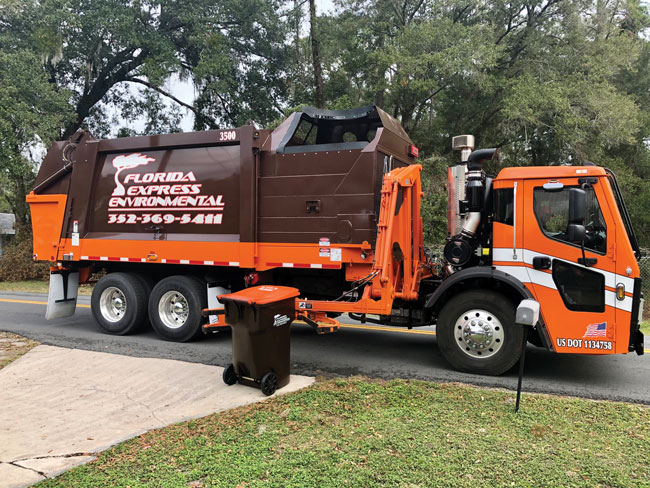While we will continue to see the push for automation industry-wide, collection trucks will continue to evolve to be more efficient and reliable, customers will be converted to the most efficient of service levels and many manufacturers will shift their focus more than ever to supplying anything related to automation as a frontline product.
By John Paglia III
It is hard for the topic of labor challenges not to be included on the top items of concern in a catchup conversation. We all are faced with the same set of challenges. To be frank, finding hard working dependable people, who are not clock-watchers, and physically and mentally able to work reliably is becoming a real challenge. Challenge is the key word. This article is not to throw in the towel on the labor pool, but it is more to point out how a challenge is creating a solution. The waste industry has a very diverse labor group ranging from a thrower on the back of the truck to someone skilled in sales and marketing. Attracting a qualified applicant is one of the most challenging parts to building a successful team. Each successful hire becomes the foundation for a reliable and dependable workforce. Missing one piece can cause the building blocks of your workforce to fall apart.
We have a saying at Florida Express Environmental, “the show must go on”, meaning no matter what is thrown our way, we must make the business perform as usual. One of the most recent challenges has been attracting the labor in order to be successful every day with rear load residential applications.

Photo courtesy of Florida Express Environmental.
The Labor Force
With the third round of stimulus checks being well circulated in the workforce by the publishing of this article, it is hopeful that the labor pool for helpers will improve. In March 2021, when Americans were receiving stimulus checks, residential throwers and applications came to a screeching halt. It is very hard to motivate someone to work when they can sit at home and collect almost as much as the wages the position generally pays due to stimulus and unemployment benefits. We use a mixture of our own and subcontract labor to fill the needs of the helper positions. There were mornings when we were only supplied with about 20 percent of the manual labor needed to complete the daily manually collected routes. Like they always do, our team stepped up and we decided that we could no longer leave ourselves open to that challenge again. We must push residential automation where we can as an industry. While automated residential collection has its own pros and cons, the need for manual labor throwing the actual trash is outdated. An automated truck only requires one driver. The manual labor now goes away as no human being must do the heavy lifting—it is now done by mechanical arm run by air and hydraulics. The largest positives of automated collection are reliability, lower/eliminating risk of injury, efficiency and sustainability.
I believe that the industry will use the pandemic situation and labor shortages as a driving reason to continue to push automated collection where it is feasible. Not only will automated collection solve the manual labor problem, but it will also protect your people and lower occurrences of workers’ compensation claims. Yes, some will argue that automation is eliminating jobs. I defend this by countering that automation is creating safer, higher paying and sustainable jobs. Yes, the garbage industry and many of its founding fathers all started on the back of a truck. It is where managers and owners receive instant gratification on the service their company provides. But short of that, finding someone
motivated to take this same career path, starting at our industry entry level position, and climbing up the job levels is a very small pool of candidates at best. We do, like many others, continue to directly employ the thrower position, in hopes they will get their foot in the door with our company, and one day grow into our CDL development program. We continue to stay positive, but success rates are not acceptable yet.
Pushing for Automation
We will continue to see the push for automation industry-wide. In doing so, the industry will adapt like it always does. Collection trucks will continue to evolve to be more efficient and reliable, customers will be converted to the most efficient of service levels and many manufacturers will shift their focus more than ever to supplying anything related to automation as a frontline product. These are only a few dynamics that will change. The key is to understand that this change is here to stay, and it is not a bad thing. Let us embrace this and make our industry safer today and in the future. That will catapult the acceleration to automation even faster for those who may have their doubts or negative views
towards automated collection. | WA
John Paglia III is a 4th generation garbage man and President of IMG, the parent company of Florida Express Environmental. Currently, John is focused on growing his company and offering the highest level of customer service and prolonging the world that we live in today. He continues to cultivate his passion for business leadership, innovation and education through his memberships in the National Waste and Recycling Association, Legislative Affairs Committee for Florida, National Interstate Insurance Corporation and the Future Industry Leader Association. He is also an active member of the Detachable Container Association. John wakes up every day knowing the impact professional haulers have on their community is far greater than most realize. He can be reached at (352) 629-4349, e-mail [email protected] or visit www.floridaexpress.us.
